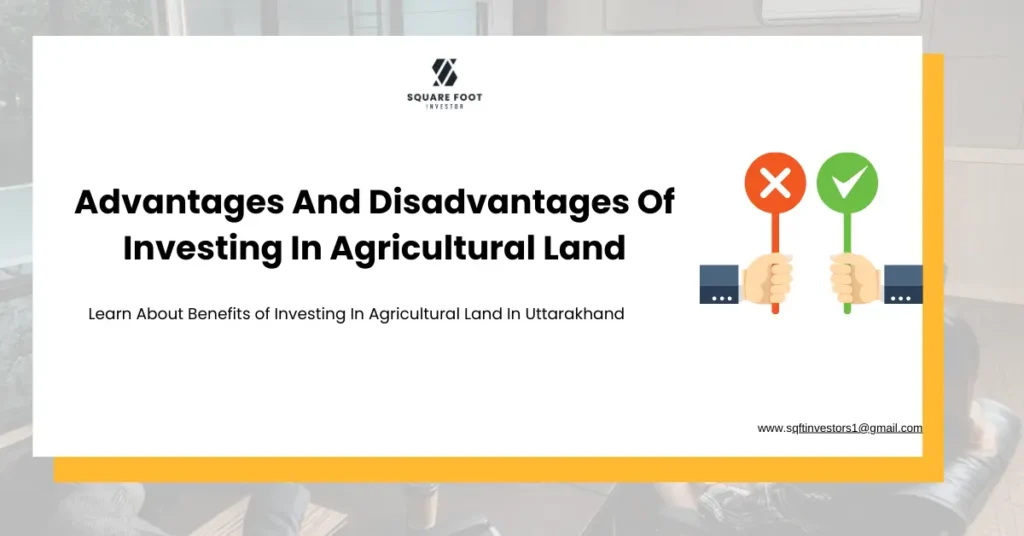If you’re considering agricultural land investment, Uttarakhand presents a unique and promising opportunity. Here’s a guide to help you explore the opportunities to invest in agricultural land in Uttarakhand.
What is Agricultural land?
Agricultural land refers to parcels of land that are specifically zoned and designated for agricultural use. Agricultural land can vary in size and may include fields, pastures, orchards, and other areas where crops are grown or livestock is raised.
Residential Plot vs Farm Plot
Residential plots are primarily designated for building homes. These plots are situated in areas zoned for residential use, ensuring that the surroundings cater to the needs of homeowners. On the flip side, farm plots are intended for agricultural purposes. These plots offer the opportunity to cultivate crops or engage in livestock farming. Farm plots are typically located in rural areas, providing a serene environment away from the hustle and bustle of city life.
1 . Investment
Residential plots are commonly considered as a long-term investment, as the value tends to appreciate over time. Farm plots can be considered an investment, especially for individuals interested in agriculture. The value of farm plots may be influenced by factors such as soil fertility and water availability.
2 . Utilities and Infrastructure
The availability of utilities and infrastructure is a key factor in the livability of residential areas. Access to water, electricity, and proper road networks enhances the appeal of residential plots. In contrast, farm plots may require considerations like irrigation facilities and storage for agricultural equipment.
3. Lifestyle Choices
Choosing between a residential and a farm plot often boils down to lifestyle preferences. Individuals seeking a quiet, nature-centric lifestyle may find farm plots more appealing, while those prioritizing urban conveniences may lean towards residential plots.
Investing in Agricultural land in Uttarakhand
Investing in agricultural land in Uttarakhand offers a distinctive blend of opportunities and challenges. The state’s rich agricultural heritage, government incentives, and unique features make it an attractive prospect for investors.
With an increasing global demand for organic produce, it focuses on traditional, and organic farming aligns with market trends.
Nowadays, Uttarakhand’s agricultural land has garnered increased attention from investors. One of the key advantages of investing in agricultural land in Uttarakhand is the potential for high yields and quality crops.
Checklist for agricultural land investment?
- Uttarakhand has diverse climatic conditions, ranging from subtropical to alpine. Ensure that the agricultural land you are considering is suitable for the type of crops you intend to cultivate.
- Check the availability of water resources, such as rivers, lakes, or groundwater, on or near the land. Investigate the local water management practices and irrigation systems.
- Ensure that the land has clear and legal titles. Verify land ownership, boundaries, and any potential legal issues related to the property.
- Stay informed about government policies, subsidies, and support for agriculture in Uttarakhand
Advantages and Disadvantages of investing in agricultural land

Agricultural land offers a unique set of advantages and disadvantages that investors should carefully consider before making such a significant financial commitment. Here are some advantages and disadvantages of investing in agricultural land in Uttarakhand.
Advantages Of Investing In Agricultural Land
Stability and Tangible Asset – Agricultural land is often considered a stable and tangible asset. Unlike stocks or other financial instruments, land is a physical asset that generally retains its value over time.
Income potential – Agricultural land can generate income through various means, such as leasing the land to farmers or engaging in agricultural activities yourself.
Value Appreciation – Depending on location, demand for agricultural products, and other factors, agricultural land may appreciate over time, providing potential capital gains.
Disadvantages Of Investing In Agricultural Land
Management Challenge – The agricultural sector is sensitive to market conditions, including commodity prices, weather patterns, and government policies. Fluctuations in these factors can impact the profitability of agricultural investments.
Regulation and policies changing risk – Changes in government policies, regulations, or subsidies related to agriculture can affect the profitability of agricultural investments.
Environmental Risks – Agriculture is highly dependent on environmental conditions. Natural disasters, climate change, and other environmental risks can impact the productivity of the land and, consequently, the investment returns.
Are there any restrictions on non-residents investing in agricultural land in Uttarakhand?
Yes, non-residents face certain restrictions when investing in agricultural land in Uttarakhand. It’s imperative to understand and comply with these regulations to ensure a smooth investment process.
For More detail read – Land Purchase Law for an outsider in Uttarakhand
Conclusion
Investing in agricultural land requires proper research, legal verification, and documentation. Investors or individuals interested in purchasing agricultural land may need to work with real estate agents or professionals who specialize in rural or agricultural real estate to navigate the specific considerations associated with these types of properties.
If you are looking to invest your money in agricultural or residential plots then there is no better company than Square Foot Investors which you can trust. We deal in commercial, residential and agricultural plots in Uttarakhand, Kotabagh. Explore our premium plots now. Contact us for more information.
Frequently Asked Questions (Agricultural land in Uttarakhand)
What crops are suitable for cultivation at different altitudes in Uttarakhand?
Altitude influences climate, so crops like apples and walnuts thrive in higher altitudes, while lower altitudes are suitable for crops like rice and wheat.
What are the things required to convert agricultural land to non-agricultural land?
Firstly you have to apply to local authorities with certain documents attached to the application. Here is a list of things that should be included in the application.
1- Name of the owner and other details
2- Date of the purchase
3- Last use of land for agricultural purposes
4- Copy of documents like sales deed, title deed, tax receipts, and registration certificate
5- Also, you have to describe your plan for purchasing a plot
6- Conversion fees
How liquid are farmland investments, and can I easily sell my farmland if needed?
Farmland is generally less liquid than other investments like stocks. Selling farmland may take time, and the liquidity can vary depending on local market conditions and demand for agricultural land in the area.



